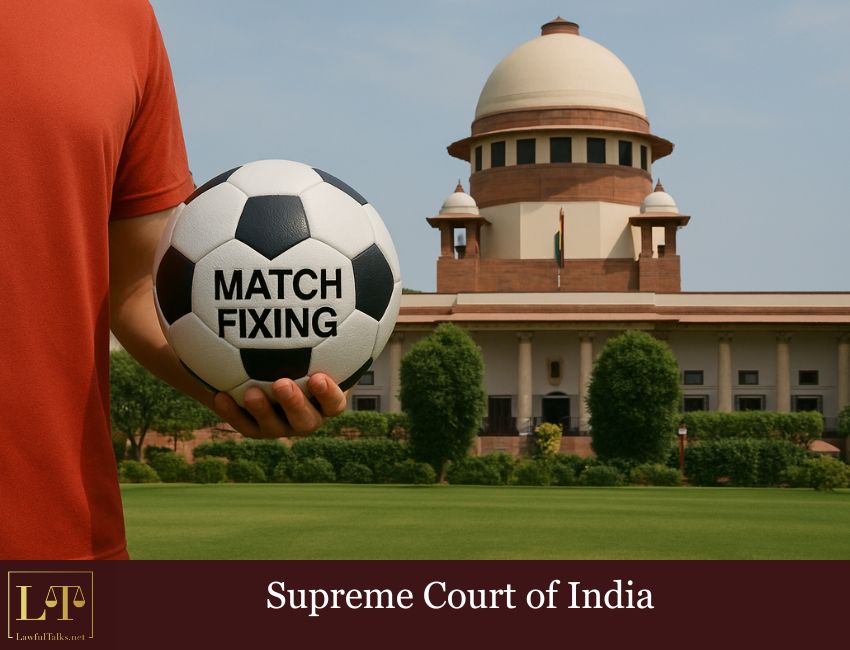Allahabad HC Sets Aside Afzal Ansari's Conviction, Allows Him to Continue as MP

Does match -fixing qualify as a criminal offense under Indian law? The Supreme court will soon deliberate on this crucial legal question, the outcome of which, will set a precedent on whether actions like match -fixing and betting that compromise the spirit of the sport , can be brought under the purview of criminal law. In light of wider ramifications surrounding the issue the bench has appointed an Amicus Curiae to assist in the matter.

The Supreme Court’s ruling will also bring clarity to broader issues like the role of criminal courts vs. sports’ governing bodies. It will also disentangle the ambiguity of the definition of ‘cheating’ in this context besides setting a precedent on what can be brought within the ambit of criminal law.
The bench of Justices Surya Kant and NK Singh who had heard a related matter have scheduled the case for further hearing on July 27 after hearing initial arguments.
Facts
1.The case originated from a chargesheet under Section 420 of Indian Penal Code(IPC) against cricketers CM Gautam (formerly of Deccan Chargers and Mumbai Indians, and a former Ranji captain for Karnataka) and Abrar Kazi (Royal Challengers Bengaluru, Ranji Karnataka, and Mizoram).
2. Allegations of their involvement in match-fixing during the 2019 edition of the Karnataka Premier League were raised in the chargesheet. Additionally, there was also the allegation that both players accepted ₹20 lakhs from bookies to underperform in the finals by design, resulting in an 8-run victory for the Hubli Tigers.
3. The Karnataka High court while quashing the proceedings noted that match-fixing does not qualify as an offense of cheating under Section 420 of IPCand any disciplinary measures, if any, shall fall under the purview of the BCCI.
The court also emphasized that acts that constitute ‘cheating’ must have essential ingredients as deception, dishonest inducement of a person to deliver any property or to alter or destroy the whole or any part of a valuable security.
The court further stated: "It is true that if a player indulges in match fixing, a general feeling will arise that he has cheated the lovers of the game. But, this general feeling does not give rise to an offence. The match fixing may indicate dishonesty, indiscipline and mental corruption of a player and for this purpose the BCCI is the authority to initiate disciplinary action. If the bye-laws of the BCCI provide for initiation of disciplinary action against a player, such an action is permitted but, registration of an FIR on the ground that a crime punishable under section 420 IPC has been committed, is not permitted. Even if the entire charge sheet averments are taken to be true on their face value, they do not constitute an offence."
The Government of Karnataka challenged this impugned final judgment and order of the High Courtin the Supreme Court.
The order of the Supreme Court mentions, “Having regard to the nature, ramifications and implications of the matter, we deem it appropriate to appoint Mr. Shivam Singh, Advocate (M.No.9873832280) as an amicus curiae to assist the Court in the matter. The Registry is directed to provide a complete set of pleadings to him.
3. A copy of the counter affidavit to be filed by the Union of India may also be supplied to the learned amicus.
4. Post these matters for hearing on 22.07.2025.
5.The Registry is directed not to delete these matters from the date fixed.
Case Information
Title: State of Karnataka and Anr. vs. Abrar Kazi and Ors
Special Leave Petition (Crl) Nos.: 9408–9411/2022

Shalini Chavan
Advocate, Bombay High Court
Latest Posts
Categories
- International News 19 Posts
- Supreme Court 352 Posts
- High Courts 367 Posts





























































































































































































































































































































































































































































































































































































































































































































































